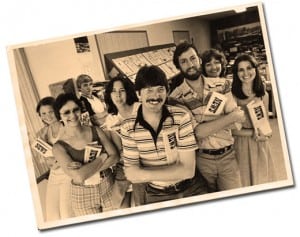I used to be a pretty good newspaperman. I loved the business. Each night, I’d go home with ink on my fingers and the flinty odor of freshly printed papers clinging to my clothes. It was the same smell that wafted through the building as huge presses rolled in the basement.

I’d stand in the typesetting room as the union setters placed each letter in the tray to build a page. Later, the printing plates were made from chemical negatives in a much cleaner, but less nostalgic way. With satellite transmission technology, the printing presses moved to the suburbs in search more reasonable rent since all that was needed was a dish to catch the pages as they returned from a trip through space from the newsroom miles away.
Things change.
The great novelists of the early 20th century were good newspapermen (and women) too. Their daily journalistic training as a wordsmith shaped their writing and their view of the world. John Steinbeck was a war correspondent for the New York Herald Tribune. Ernest Hemingway did a stint at the Kansas City Star as a police reporter. There he learned a style that forged his fiction writing: Use short sentences. Use short first paragraphs. Use vigorous English. Be positive, not negative.
Who is the guy named REWRITE?
During Hemingway’s days as a newspaperman, there was a common refrain that blasted from the news editor’s desk (usually in the center of the room or bullpen as it was known). “Get me REWRITE!” was newspaper-speak for rounding up the copy editor on duty who reshape someone else’s prose.
Editors are notoriously callous when it comes to chopping up some poor reporter’s hard work, stripping the flowery language and getting straight to the facts. It was Rewrite’s job to do just that. Some great rewrite men went on to become columnists and authors. These guys could pour out words in the right order to mesmerize readers faster than a transcriptionist could type them.
Not everyone is so blessed. Most of us have to struggle a bit to find the right word or to start a paragraph. Too often, we sit and stare at the blank page (or screen) hoping something will come. But one lesson I learned in my many years of newspapering was that it’s much easier to rewrite something than it is to start from scratch. That’s why I like to start with a press release or a private label article.

The problem with most private label content is suspect quality. Often, a non-native English speaker from another country tries to throw in the slang they hear on TV, or they just doesn’t quite get the nuance of word meanings. And it’s not subtle when it’s botched.
How do you fix the quality PLR content issue?
But I’ve found a solution to the PLR quality issue. In fact, this PLR source is so good that I don’t even rewrite it much when I use it. It’s Nicole Dean’s EasyPLR service. I’ve bought just about every piece of content she’s produced. And I use it all the time in many niches. Usually, I don’t give away my sources for such great content. But Nicole’s content is so good that you could sue me for negligence if I didn’t tell you.
She’s single-handedly changing the PLR game.
And she’s doing it at ridiculously low prices. I can’t figure out how she’s making money on this yet.
Check it out and let me know what you think in your comment below.
Leave a Reply